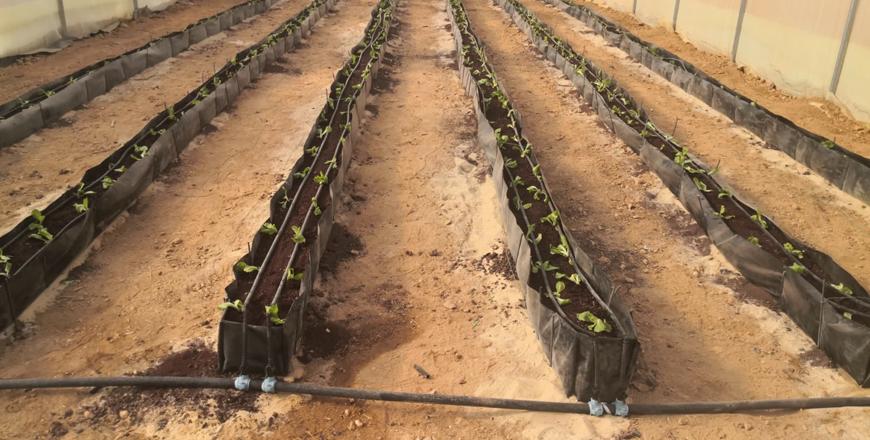You are here
Water Innovations Technology project saved around 23mcm of groundwater in Jordan — USAID
By Batool Ghaith - Dec 29,2021 - Last updated at Dec 29,2021

A view of a farm in Mafraq equipped with the Hydroponic system for cultivation as part of the USAID’s Water Innovations Technology project (Photo courtesy of Ayman Abu Kishek)
AMMAN — According to the United States Agency for International Development (USAID) Jordan, the Water Innovations Technology (WIT) project has saved around 23 million cubic metres (mcm) of groundwater in Jordan, which is enough drinking water to meet the annual needs of approximately 630,000 people.
USAID Jordan stated that the WIT project, which started in March 2017 and will end in March 2022, identified two methods to save water: Water-efficient irrigation material and technologies — including drippers, shade nets, scientific design of irrigation networks — and water-conscious practices and behaviour.
“USAID worked with farmers in northeastern Jordan [east of Mafraq and in Azraq] who rely on groundwater for irrigation. Their farms were already equipped with irrigation systems, which required updating for more efficient water use. USAID has made adjustments included matching the irrigation equipment specifications to the needs of the crop or designing the full irrigation system in a way that prevents leaks,” USAID Jordan told The Jordan Times.
USAID collaborated with irrigation equipment suppliers who serve many farmers in the Mafraq and Azraq areas to widen the reach and maximise impact.
USAID Jordan noted that WIT helped the equipment suppliers improve the pre-and post-market services they provided to farmers, teaching farmers how to adopt water efficient technologies.
“There was a 25 per cent increase in sales of the water-efficient technologies WIT promoted,” according to USAID Jordan.
“Agriculture is an important source of income for many rural Jordanians. By increasing water efficiency in agriculture, farmers can stretch the resources they have, saving time and money spent on the energy used to treat and pump their water. By conserving water, these farmers are protecting their livelihoods,” according to USAID Jordan.
USAID said it also works in communities to rehabilitate ponds and small water retention structures or small dams as a way to create a local supply of non-potable water, which provides the community with an additional source of water, and also helps relieve the pressure and demand on public water supply networks, saving Jordan’s important groundwater reserves for household use.
Preserving groundwater increases Jordan’s water security by helping Jordan maintain a supply of groundwater for the future, USAID Jordan noted.
USAID Jordan highlighted that the WIT project demonstrates that food can be grown with two to five times less water than what has been traditionally used on some farms in the northeast of Jordan. By using less water, the farmers are extending their existing water resources and strengthening the security of their agricultural investments into the future.
USAID said it supports many other water projects in the Kingdom, as water security in Jordan is a key focus for the US government.
“USAID currently has over $500 million in active programming aimed at helping Jordan build new water infrastructure, update water networks, reduce water losses, and strengthen water conservation,” the agency said, noting that Jordan is one of the most water scarce countries in the world.
Osama Zyoud, a beneficiary farmer in Azraq, said that the WIT project has enabled him to raise the efficiency of his farm’s irrigation system from 20 per cent to 90 per cent.
“USAID provided my farm with new techniques which did not exist in Azraq, as my farm was the first to have a multi-purpose meteorological unit, which is very important to know the thermal accumulations, rain and wind, and to predict frost, it also determines the quantities of irrigation water needed for crops,” Zyoud told The Jordan Times on Wednesday.
Zyoud added that the WIT project provided new high-efficiency irrigation systems suitable for Azraq’s soil and environment (the BC system), in addition to an advanced self-cleaning filtration system, and the introduction of the electronic irrigation system for the first time in Azraq through underground sensors as well, noting that he uses an application to monitor and irrigate his farm.
“USAID has also provided me with $150,000, which helped me to establish an olive oil filtering and filling line,” he said.
Zyoud expressed his gratitude for the USAID’s efforts, as it not only helped in his farm, but also gave him an opportunity to work as a field consultant within the WIT project.
Another farmer in Mafraq, Ayman Abu Kishek, said that his farm has saved the most amount of water after the WIT project, up to at least 30 per cent.
“Jordan greatly lacks irrigation engineering, as farmers suffer from poor water distribution. The WIT project helped in distributing water fairly to all farms and all crops and trees equally through modern irrigation systems, which not only helped to save water, but also saved electricity, and fertilisers and distributed them evenly to all trees,” Abu Kishek told The Jordan Times.
He noted that the new irrigation system gives each tree 24 litres per hour, which saves 25-30 per cent of fertilisers, noting that he farms fruits and also has green houses.
He praised the WIT project’s role in the “agricultural revolution” in Mafraq, saying: “We hope that there will be more similar projects in the entire Kingdom to help farmers and to develop agriculture”.
Related Articles
AMMAN — Azraq is a small town in northeastern Jordan characterised by hot, arid summers and cold, dry winters.
AMMAN — Water pumping from the Kingdom’s main aquifers increased by 32 per cent between 2017 and 2018, according to a new study released on
AMMAN — The US Agency for International Development (USAID) recently announced the completion of the restoration of the Queen Rania rainwate

















